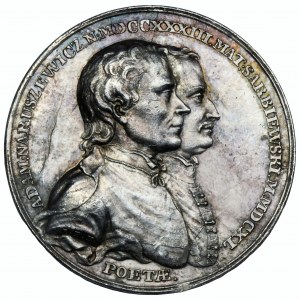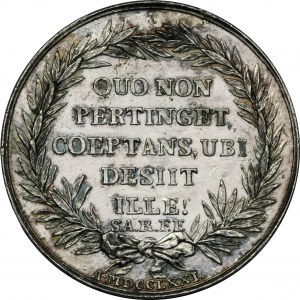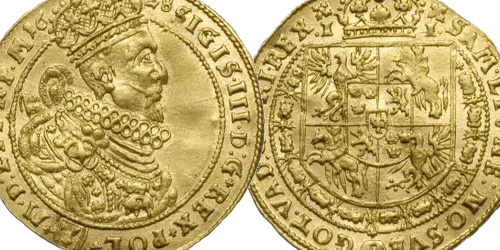Very rare medal by Jan Filip Holzhausser, signed I.P.H. on the shoulder, depicting Adam St. Naruszewicz and Maciej K. Sarbiewski.
Obverse: busts of the two poets to the right, below them the inscription POETÆ.
ADAM NARUSZEWICZ N MDCCXXXIII MAT SARBIEWSKI M MD CXL (Adam Naruszewicz born 1733. Maciej Sarbiewski died 1640).
Reverse: six-line inscription in an ornamental wreath, at the bottom under the wreath MDCCLXXI
QUO NON PERTINGET, COEPTANS, UBI DESIIT ILLE! S.A.R.F. F. (where the one who starts where the one stood will not reach).
Silver, diameter 44 mm, weight 37.91 g
Edward Raczynski writes about this item: "Mateusz Kazimirz Sarbiewski was born in Plock province in the year 1595. Having become a Jeznita, after some time he was sent to Rome. He had a liking for antiquities and became accustomed to them under the guidance of more proficient men of this kind. He became so well acquainted with his own scholarship that in this capital of Christianity he was obliged to teach the laws of literature.
The more illustrious princes took pains to show respect for him. Urban VIII took a great liking to him, for the smoothing and writing of church hymns, so far remaining in the breviaries, he called on his help, endowed him with a wreath of laurel, and when returning to Poland he kissed the pope's feet, he himself hung a costly golden numismas around the poet's neck. - In Vilnius he took up the chair of eloquence and philosophy, and was surrounded by numerous students. When he received his doctorate in theology, he was honored by Vladislav IV with a ring removed from his finger; this signet ring was used in the academy for similar ceremonies until recent times. In Krosy in Samogitia he was a teacher of the rhyming art; the tree-covered mountain called Miedziokalnia was particularly fond of him; he often took walks there, he liked to rest there, he wrote immortal poems, he carved them on oaks, like old people in the place where they lived, according to legends. - Wladyslaw the king made him his preacher; his life, his hunting, his travels to Baden's warmth were pleasant companions. - Whether at court or in a monastic cell, he always had exemplary writers beside him, namely Horace, Virgilius and Pindar; he sought and found in them nourishment for the soul and refreshment of thought. He was so fond of them that he read them dozens of times, which was recorded by his hand on the exemplar of the Aeneid in the Drohczyn monastery. He had a table by his bed and everything for writing at the ready, so that he wouldn't miss any poems that came to him in the middle of a sleepless night. His rhyming works, in various countries, published in print in large numbers, put him among the best writers. He sings the praises of: the saints of the Lord, the Mother of God, the heads of the church, the rulers of Europe; he stimulates the recovery of the empire of the East; the deeds of Sigismund III, the victories of Ladislaus IV, the allegiance of the Danzigers he proclaims, Chodkiewicz and other countrymen and Romans he adores. In 1640 he moved to eternity (a).
Adam Narushevich, from parents settled in the Pinsk district, was born in 1733, in his 15th year of life, entered the Order of the Name of Jesus. Sent to Lugdun in France, where there was an excellent collegium of the order, supported by the generosity of Prince Czartoryski, Chancellor of Lithuania, he was able to visit Viochy, France and Germany. Having returned to Poland, he taught poetry at the Vilnius academy; transferred to Warsaw, he gave lessons to noble youth at the Jeznits convent. Experiencing the protection of Prince Adam Czartoryski, general of the Podolia lands, he found an introduction to the wealthy, at the court. Stanislaus Augustus took a liking to him, after the abolition of the Jesuits placed him by his side; wanting to elevate him, he successively ensured him and his fate, coadjutor of the Smolensk bishopric, writer in. x. lit., secretary of the perpetual council, bishop of Smolensk, and in 1790 appointed him shepherd of Lutsk, decorated him with Polish orders, honored him with this medal, placed a bronze bust of him in the hall of fame dedicated to his countrymen. Speaking of the rhyme-maker, I won't mention other works here; we have four volumes of his own poems. Grateful to the king, a witness to the country's misfortunes, he spent the last days of his sad life in Janov, the bishop's residence at the time. There he died on July 6, 1796.
Between Sarbiewski and Naruszewicz there are similarities, there are differences, and great differences. These to show, the measure, so to speak, of their genius to cross out, I see the need.
Both Poles, the same overwhelming order, capturing people, over whose forehead and in youthful age the star of the future shines brightly, drew them to his circle; both, for the sake of complete perfection, foreign, the same almost visited the same countries; there was no shortage of protectors for one and the other, in the capital at the court of kings, ample room to develop their abilities. Both poets and lyric poets.
Sarbiewski wrote in Latin, Naruszewicz in Polish, two centuries almost preceded the first bard his follower. All this, however, means less, the differences of the centuries in this regard, petty, unmatched almost. - The oak of the Romans and the Polish oak are both green boughs spread wide, the top of the clouds, the roots reach the interior of the earth. The spirit of Pindar, Horace and in 2000 years in a true poet will be reborn. - With the language of Rome singing the lute, Sarbiewski thought in Polish; all the more worthy of the merit, that he also overcame this difficulty and poured all the sweetness, grace, harmony of his patterns into the Vistula.
I read the two writers with deeper consideration, in order to refresh them in my memory, and it seems to me that it was not a very happy thought of Sarbiewski and Naruszewicz combined together: the element of life in one and the other, style and color different at all.
If it is true that poetae nascuntur.... Sarbiewski was born a poet; having digested in himself the classics of his kind, educated and delighted, he became a poet-poet; in the capital of the world once, now of Christianity, called to work, encouraged by the head of the church, he became a religious bard; as a Pole, a national bard. Might he not have been inspired by the sight of Jan Karol Chodkiewicz, already famous for his victories, touring the schools, that hero's statue in the Medici garden, the kindness of the king who brought him together, the splendor and fame of his native land? So does he speak to us about us, does he exhort the citizens of Poland and Lithuania to harmony, honors strangers with his rhyme, or finally sings the grasshopper: Like Horace, lofty, philosophical; like Horace, sweet and tender. Speaking in such an ornately comprehensible language, having met on the Elysian fields, the predecessor probably gave a brotherly hand to his worthy successor.
Left to his own will, whether Narushevich would have indulged in poetic raptures, I dare not say. He lived during the reign of Stanislaw August; in him he found a benefactor. This king, more than any other, bore a crown of thorns. Resurrecting science, surrounding himself with scholars, in this at least he found no resistance, he sought to sweeten his worries, and he felt how much he would be able to do at least by this means, for his own fame, for the good of the country. Narushevich, who was no stranger to him, said to himself: "You have to be a poet!" and became one; he bent his pen to the ends, to the measure of a poem, his style was blown up, with mytology, erudition, with folding words he made his hair stiff and dull, and coming out of the rather hard prose he liked, he became a verse writer. With a feeling of gratitude, perhaps driven by courtliness, he could more easily entertain the lord with his poetry, celebrate his solemn days, pay off Thursday dinners, entertain pleasantly and usefully, fill his magazine, inspired by the king, and win the favor of the lord. After all, as enlightened and zealous in his work, one can not refuse, lest, indeed, he also sometimes rise, fly higher.
To whom to give preference, the answer is easy. And the emblem of the medal too harsh, Sarbiewski hurtful. Not the bard who wrote more, to whom they applaud today, but who has survived the centuries, whom not only the fathers in the fervor, but also the grandchildren, whom he did not reach, cherish. Naruszewicz, the builder of words, to use this expression, pounding boulder upon boulder, took on a Tuscan order; Sarbiewski the creator and thought of appealing and shapely ornaments, every one of his constructions into Corinthian columns. The former a poet of reason, the latter of feelings and heart. For these reasons, while his predecessor acquired European fame and still enjoys it, his successor, a court poet, famous in his age, almost unknown outside the lands of the Brave, will lose more and more of his fame with the passing of time.
Be that as it may, when Naruszewicz was hailed as a poet, he should have been placed next to Krasicki. It would have been better if they had turned out as a pair, at the same time, although so different: the noisy, thundering one; the sweet, colloquial, fond one. In Naruszewicz's poetry, Tacitus pierces through, so much influenced by our favorite writer; in Krasicki's Voltaire, but Voltaire, not that virulent, rubbishy, communal, sneering, but rather polite, of higher birth and education, with kindness, humorous. As the first, they were to find imitators; following the example of Michelangelo and Raphael, each to form their own school. Supporters of the first: Trębecki and Voronicz; Krasicki was looked up to by the clever and biting Hungarian, the smoothed-out Szymanowski, the cheerful and proverb-rich Zablocki, and the smooth, often tearful Niemcewicz.
We would have preferred that Naruszewicz be honored with a medal as a historian; here he acquired a fairer and more thorough fame; here, in his early days (because Czacki Tadeusz died early), he may not have had a rival, who would have overshadowed his merits, who would have surpassed him."









